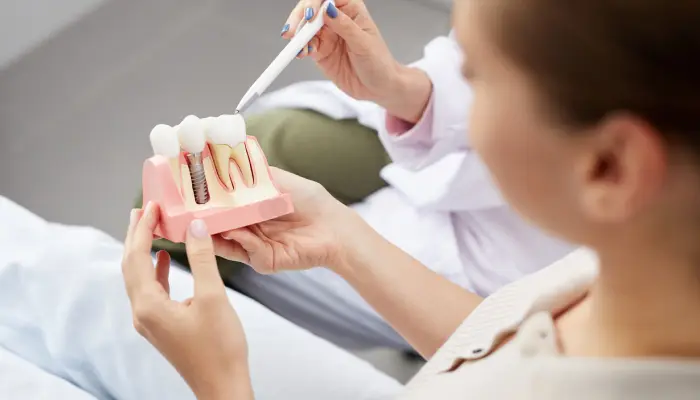
Millions of American adults suffer from missing teeth. In some cases, missing teeth are due to genetics- the teeth never come in or the patient is predisposed to tooth loss due to medical conditions. In other cases, tooth loss is due to poor habits such as poor oral hygiene, smoking, etc.
Regardless of the cause, tooth loss can cause a variety of oral and overall health complications. When you are missing teeth, it’s difficult to bite/chew food which means you don’t always get the nutrients you need. In addition, missing teeth can have a major impact on your confidence.
The good news is, that at Diamond Dental, we have options for tooth replacement. One of the most popular options is dental implants.
A dental implant is an appliance that replaces one or more missing teeth. While the term is used to describe the entire thing, the implant is only a portion of it.
The implant is inserted into the jawbone to serve as an artificial tooth root. Once the jawbone has healed around and fused to the implant, a prosthetic is attached. For single-tooth implants, a crown is attached. For multiple tooth replacement, we attach a bridge or overdenture.
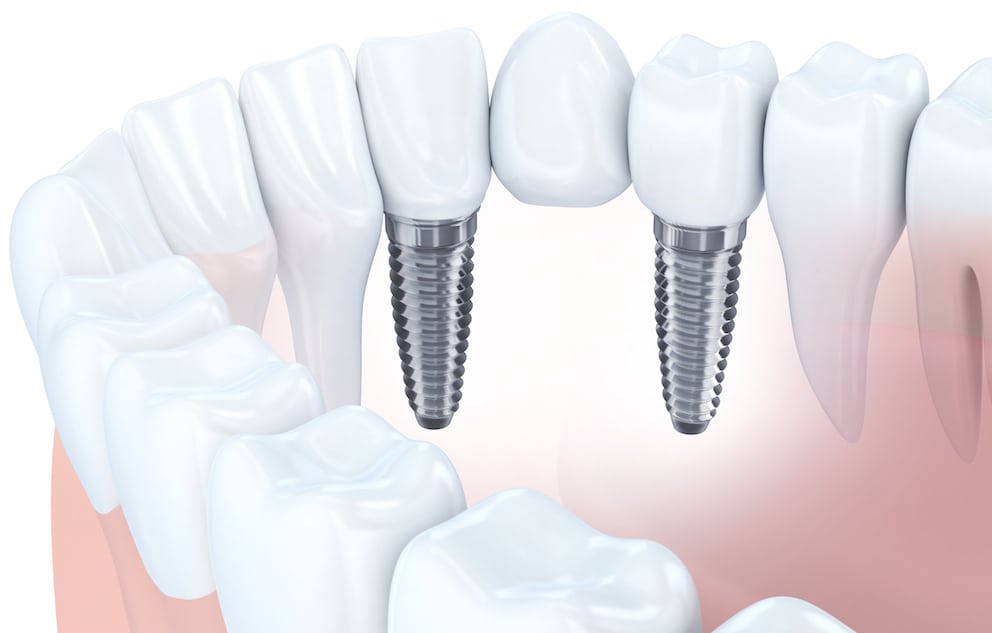
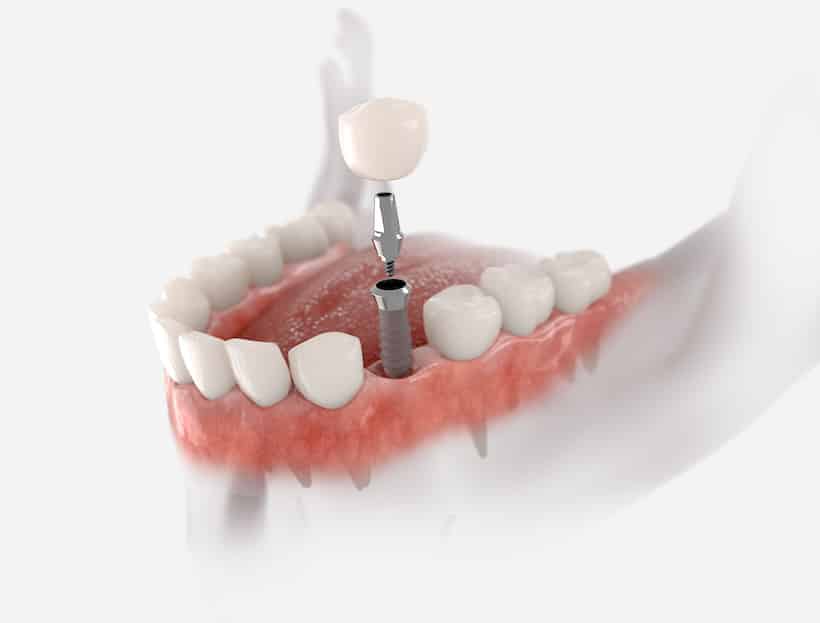
The dental implant procedure takes a minimum of several months from start to finish, starting with the consultation.
The first step is the initial consultation. At this time, one of our highly-trained dentists will examine your mouth and take x-rays to determine your need for implants. If it is determined that you would benefit from dental implants, the x-rays will be used to determine placement. We will also decide at this time if you need additional procedures such as extractions and/or bone grafting.
The next step is the preparation procedures. If you do not need these procedures, this step will be skipped. The first thing we will do is perform any extractions that are necessary. This is typically only needed if you are missing most of your teeth and are interested in the All-on-4 or All-on-6 procedure. If you have been missing teeth for some time, you may have some jawbone loss. In this case, bone grafting may be necessary to create enough bone density to place the implants.
Next, we will place the implants. In some cases, this can be done on the same day as any extractions. However, if bone grafting is required or the extractions are extensive, this step may need to be put off until you have healed. We start by making an incision in the gum and then drilling a hole in the jawbone. The implant is placed in the jawbone and the surgical site will be stitched closed.
Over the next few months, osseointegration will take place. This is the process of the jawbone healing around and fusing to the implant, securing it in place. At this point, the implant becomes like a tooth root.
When osseointegration is complete, you will return to the office and we will place the abutment, which is the piece that connects the prosthetic tooth to the implant. A healing cap will be placed on top of the abutment to keep the gum from healing over it. You will be given a few weeks for your gums to heal and prepare for the placement of the crown or overdenture.
Finally, you will return to the office, and we will place the crown or overdenture. Once this is secured in place, you will not be able to remove the prosthesis. Your smile will be fully restored.
Dr. Najar and the team at Diamond Dental are proud to offer several different types of dental implants, based on your needs. For patients who are missing one tooth, we recommend a single implant. However, for those who are missing most or all of their teeth, we recommend All-on-4 or All-on-6.
Single Implant
A single implant is designed to replace a single missing tooth.
All-on-4 implants
All-on-4 Implants is a system of replacing a full arch of teeth (upper or lower) with 4 implants as support. Two implants are placed at the front of the jaw and two at the back, with the back ones at a 45° angle. This provides the base needed to properly support the overdenture.
All-on-6 implants
All-on-6 Implants is a system of replacing a full arch of teeth (upper or lower) in patients who require more than 4 implants. This system uses 6 implants, evenly distributed through the jaw, to support an overdenture.
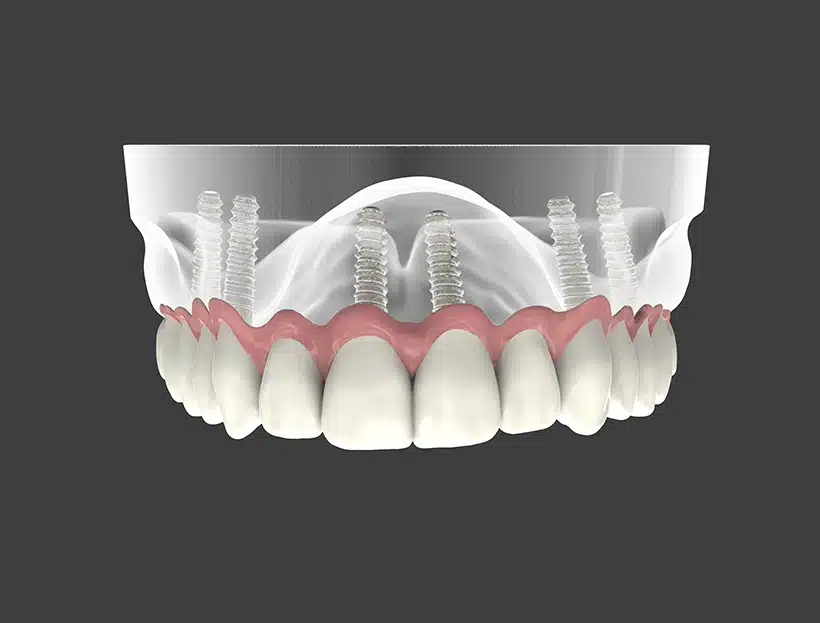
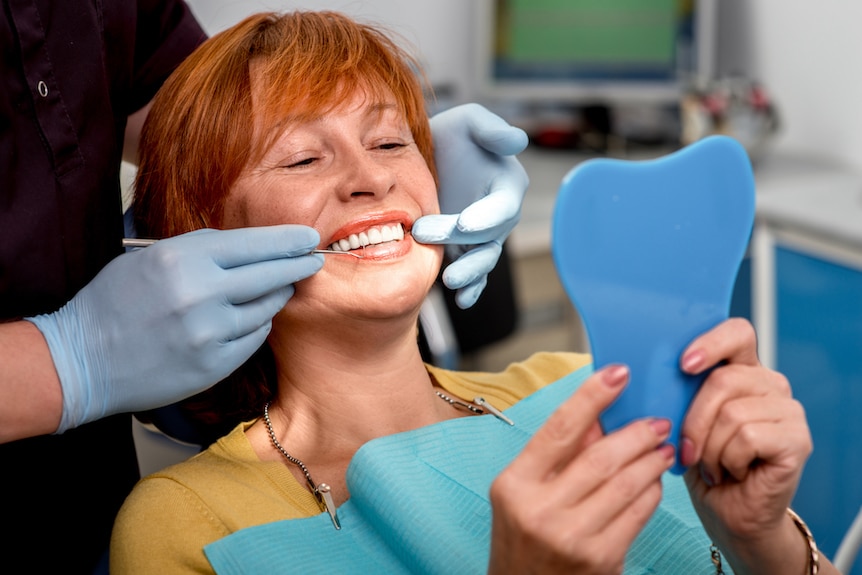
Dental implants are considered the “gold standard” of tooth replacement because this solution looks, feels, and functions the most like natural teeth. This solution offers many benefits over other alternatives such as dentures or bridges.
Dental implants are durable
Research shows that, with proper care and maintenance, dental implants can last a lifetime. On the other hand, dentures often need to be replaced every 10 years and bridges every 5 to 15. Additionally, dentures need to be relined from time to time, as jawbone deterioration can cause them to become loose. Once dental implants are placed, they become a permanent part of your jawbone and don’t require any additional adjustments. As long as you practice proper oral hygiene and visit the dentist for a cleaning and check-up every 6 months, you should have no problems.
Dental implants prevent bone loss
Dental implants can prevent jawbone deterioration after tooth loss. Your jawbone needs stimulation to remain healthy and your teeth provide that stimulation. When you lose a tooth, that area of your jawbone isn’t being used anymore, so your body will reabsorb it. This process typically begins within 6 months of tooth loss. Therefore, it’s important to get implants as quickly as possible to prevent this from happening.
Dental implants look/feel natural
Dental implants are inserted into your jawbone, acting as artificial tooth roots. This offers stability for replacement teeth, whether a crown for a single tooth, a bridge for several teeth, or an overdenture for a full arch.
Dental implants keep neighboring teeth in place
When you lose a tooth, the neighboring teeth will typically begin to shift into the gap, which can cause problems with biting/chewing. A dental implant fills in the gap, which keeps your other teeth in their appropriate positions.
Dental implants support natural facial structure
Your jawbone will begin to deteriorate when you are missing teeth. This can cause your facial shape and structure to change, causing you to look much older than you really are. Dental implants keep the jawbone healthy, which keeps your face firm.
Dental implants function like natural teeth
When you are missing teeth, your ability to speak clearly is impacted because the way air passes through your mouth is changed. You may develop a lisp or have difficulty pronouncing certain words. However, dental implants fill in those gaps, allowing you to speak normally.
Missing teeth also impact your ability to chew. When you are missing teeth, it’s difficult to bite and chew certain foods. Dental implants are stable enough that you don’t have to give up your favorite foods, no matter how difficult they are to chew.
Dental implants restore bite force
Dentures and bridges are not always very stable and may slip around in the mouth, making it difficult to bite/chew. However, since dental implants are inserted in the jawbone and act as tooth roots, your restorations have the same stability as your natural teeth.
Dental implants improve quality of life
With all of the above benefits, it’s easy to see how dental implants can improve your overall quality of life. Plus, success is higher with dental implant restorations and the risks are low.
Dental implants are among the most expensive tooth replacement options. On average, a single-tooth dental implant costs $3,000 to $4,500 for the implant and implant surgery itself. This does not include any additional procedures such as sedation, extractions, or bone grafting/sinus lifting.
Full-mouth dental implants cost an average of $29,000 to $40,000+ per arch. Once again, this cost only covers the implant and the implant surgery.
The good news is, many dental insurance providers will cover a portion of dental implants and Diamond Dental offers a variety of financing options to help you get the treatment you need for your oral and overall health.


Since dental implants require oral surgery, patients must be healthy enough to undergo surgery. Also, patients must be over the age of 18 or have reached skeletal maturity. This is because if a patient is still growing/developing, the implant may be disturbed and fail.
Contact Bellingham, WA, or Mount Vernon, Wa
Dental implants are among the most expensive tooth replacement solutions, with a single-tooth implant costing between $3,000 to $4,500. Full-mouth dental implants, such as All-on-4 or All-on-6 cost between $29,000 to $40,000+. This depends on the number of implants required as well as any additional procedures.
The good news is that some dental insurance plans will cover a portion of the treatment. Our office staff will work with your provider to determine coverage. Once we have a quote, we will explain your portion of the cost and also our financing options.
According to experts, dental implants are designed to be a permanent, durable tooth replacement solution.
Before the procedure starts, we will administer local anesthesia to numb the area so you won’t feel any pain, but you may feel some pressure. For patients who have dental anxiety, we do offer sedation options. This will allow you to sleep through the procedure and, when you wake up, you won’t remember anything.
While there is no upper age for dental implants, we do not do implant surgery on children under the age of 18. This is because, prior to this, their jawbone is still growing and developing. If implants are placed prior to skeletal maturity, the restoration can get in the way of bone development, which compromises the durability of the implant, causing complications and failure.
While it’s true that milk does a body good- you should avoid dairy while you are healing from implant surgery. This is because dairy has been shown to trigger an inflammatory response in soft oral tissues, which can impact healing. Additionally, dairy may cause nausea and vomiting in some patients. When you vomit, the stomach acids can cause inflammation in the implant site, which can ultimately lead to implant failure. Once you heal, you can go back to enjoying as much dairy as you like.
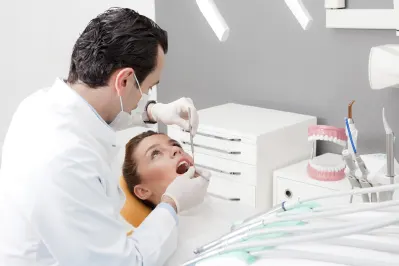
Wisdom teeth, extra teeth, or very crowded teeth present situations that may mean treatment involving removal.
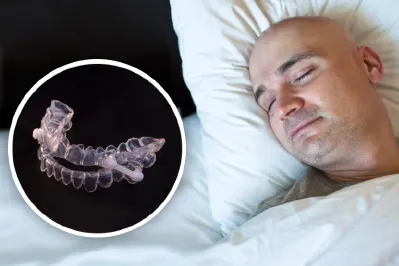
Oral appliances offer simple, non-invasive care for a variety of conditions.
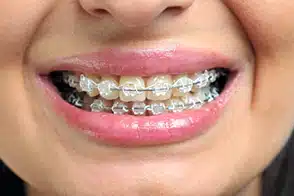
Orthodontics involves teeth straightening and jaw alignment, combining beauty and function.

You can experience dental treatment in a comfortable, customized approach with several different methods of sedation.

Our dentists’ backgrounds in restorative dentistry allow them to develop solutions for every scenario.


When you step into Diamond Dental, you’ll know you’ve found the perfect place for your family’s care.

Volumes of research confirm the influential role of smiles on our relationships and our self-esteem.

Dr. Najar and associates carefully select technologies proven to deliver the finest experience to their patients.
Office Hours:
Monday: 9am – 6pm
Tuesday: 9am – 5pm
Wednesday: 9am – 5pm
Thursday: 9am – 5pm
Friday: 9am – 4pm
Office Hours:
Monday: 9am – 6pm
Tuesday: 9am – 5pm
Wednesday: 9am – 5pm
Thursday: 9am – 5pm
Friday: 9am – 5pm
Copyright © 2024 Diamond Dental
Dental Marketing by WEB MARKETING FOR DENTISTS